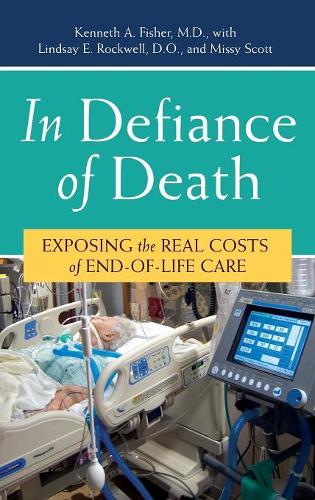
In Defiance of Death: Exposing the Real Costs of End-of-Life Care
(Hardback)
Publishing Details
In Defiance of Death: Exposing the Real Costs of End-of-Life Care
By (Author) Kenneth A. Fisher
By (author) Lindsay E. Rockwell
By (author) Missy Scott
Bloomsbury Publishing PLC
Praeger Publishers Inc
30th March 2008
United States
Classifications
General
Non Fiction
Medical ethics and professional conduct
Palliative medicine
362.1750973
Physical Properties
Hardback
240
Description
Death is a natural part of life. But it has become a painful, protracted, humiliating process that is often inappropriate for the healthcare patient, puts an undue financial and emotional burden on the family, and provides a model of improper care for physicians in training. And it's expensiveabout 22 percent of all medical expenditures are for people in the last year of their lives. Further, while studies show that 90 percent of all people would prefer to die at home surrounded by family and friends, the reality is that more than 70 percent die in institutions. As Dr. Ken Fisher argues so passionately in this book, it's time for a change. End-of-life care in the U.S. has evolved over the years into a nightmare for patients and family members, and it has created a near-crushing financial burden on the medical system that is not just excessive but unsustainable. It has driven the cost of healthcare out of reach for many people, and it is a large factor in preventing the creation of universal coverage. In Defiance of Death reviews the current state of end-of-life care and highlights its many problems from a variety of economic, political, and social perspectives. Fisher and Rockwell illuminate the ethical dilemmas we all face as technology allows us to prolong lifebut at a huge human and financial cost. This book documents these problems and provides a historical perspective of how our medical system evolved. It argues that America's defiance of death is far too costly and recommend that all stakeholdersincluding the public, medical community, Congress, and business leadersjoin together to create a system that improves end-of-life care for everyone involved. This book, with workable solutions to improve our medical system, helps point the way.
Reviews
Nephrology consultant Fisher exposes the interface between economics and compassion issues in the dying process that, in the US, is often protracted and medicalized. He proposes possible solutions to address the economics of dying and provide a more humane death. A historical review of hospital and nursing home development, health professionals' education, and health care legislation, along with data about the US's poorer outcomes and higher costs compared to many Western nations, paints a dismal picture. Interlaced with this material are patients' stories that illustrate the human suffering that results from dysfunctional health care. This book is most valuable in helping to illuminate the issues and raise awareness--for consumers, health professionals, and politicians--about the fallacies of the current system. Fisher's proposed solutions include oversight from a tiered system of appropriate-care committees (which are somewhat emulated by current institutional ethics committees, and likely will not be accepted in today's sociopolitical climate). At the root of many issues is what is so poignantly discussed in the foreword: the importance of having health care professionals who are connected with their patients. Professional-patient communication is not occurring, or not occurring early enough in the illness trajectory--for the many reasons so aptly explained here. Highly recommended. * Choice *
the beauty and real value of this book is its call for readers to become engaged themselves. * Journal of the American Medical Association *
Author Bio
Kenneth A. Fisher, M.D., is a nephrology consultant for the Borgess and Bronson Hospitals in Kalamazoo, Michigan. For over forty years, he has served in a variety of clinical, teaching, and research positions. He has written dozens of scientific and policy articles in such publications as Clinical Nephrology, American Journal of Physiology, American Journal of Medicine, and American Journal of Obstetrics and Gynecology. Lindsay E. Rockwell, D.O, is a hematologist and oncologist in private practice in Northampton, Massachusetts. She is the Director of Integrative Oncology at Cooley-Dickinson Hospital and is involved in numerous research endeavors examining the role of complementary medicine for the oncology patient. She has been published in the Journal of Clinical Oncology, presents at oncology conferences, and has a special interest in palliative care as well as women's issues in the context of cancer care. Missy Scott, a former broadcast journalist, is a freelance writer and instructional designer. She writes courseware and supporting materials for teachers in colleges, universities, and healthcare training schools.
